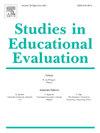An AI-assisted critical thinking intervention to enhance undergraduate EFL learners’ writing proficiency
IF 2.6
2区 教育学
Q1 EDUCATION & EDUCATIONAL RESEARCH
引用次数: 0
Abstract
This study investigates the effects of an AI-assisted critical thinking (CT)-oriented writing intervention supported with ChatGPT involving 250 undergraduate EFL learners from three public universities. The research measured changes in students’ writing proficiency and their acceptance of ChatGPT in CT-oriented writing practices. A pretest-posttest design was adopted, with data collected through pre-post-writing tests (n = 250), an acceptance questionnaire (n = 250), and further semi-structured interviews (n = 25). The writing tests were evaluated across nine dimensions: clarity, accuracy, precision, relevance, depth, breadth, logic, significance, and fairness. The acceptance questionnaire, grounded in the Extended Unified Theory of Acceptance and Use of Technology (UTAUT2) model, assessed six constructs, i.e., performance expectancy, effort expectancy, hedonic motivation, habit, trust, and behavioral intention. The results showed that 1) The intervention significantly enhanced students’ CT reflected in writing; 2) Positive shifts were observed in four scales of ChatGPT acceptance in a CT-oriented writing context, i.e., performance expectancy, effort expectancy, trust, and behavior intention, though only marginal increase in hedonic motivation and habit. Meanwhile, the study identified the primary aspects of ChatGPT influencing EFL learners’ CT-oriented writing. These results demonstrate the potential of ChatGPT as a scaffolding tool for CT-oriented writing training in EFL contexts. Despite limitations such as the single-group experimental design and 8-week experimental period, the findings offer valuable insights for further research and development in AI-driven tools in EFL writing pedagogy. Future research could adopt a multi-group design and longitudinal assessments to further validate the intervention’s sustained effects.
人工智能辅助批判性思维干预提高大学生英语学习者写作水平
本研究调查了由ChatGPT支持的人工智能辅助批判性思维(CT)导向写作干预的效果,涉及来自三所公立大学的250名本科英语学习者。该研究测量了学生在面向计算机的写作实践中写作熟练程度的变化以及他们对ChatGPT的接受程度。采用前测后测设计,通过写作前后测试(n = 250)、接受问卷(n = 250)和半结构化访谈(n = 25)收集数据。写作测试从九个方面进行评估:清晰度、准确性、精确性、相关性、深度、广度、逻辑性、重要性和公平性。接受度问卷基于技术接受与使用扩展统一理论(UTAUT2)模型,评估了六个构式,即绩效期望、努力期望、享乐动机、习惯、信任和行为意图。结果表明:1)干预显著提高了学生在写作中体现的CT;2)在计算机导向写作情境下,绩效期望、努力期望、信任和行为意向四个量表的接受度均出现正向变化,但享乐动机和习惯仅略有增加。同时,该研究确定了ChatGPT影响英语学习者面向计算机写作的主要方面。这些结果证明了ChatGPT作为英语背景下面向计算机语言写作训练的脚手架工具的潜力。尽管存在单组实验设计和8周实验期等局限性,但研究结果为进一步研究和开发人工智能驱动的英语写作教学工具提供了有价值的见解。未来的研究可以采用多组设计和纵向评估来进一步验证干预的持续效果。
本文章由计算机程序翻译,如有差异,请以英文原文为准。
求助全文
约1分钟内获得全文
求助全文
来源期刊

Studies in Educational Evaluation
Multiple-
CiteScore
6.90
自引率
6.50%
发文量
90
审稿时长
62 days
期刊介绍:
Studies in Educational Evaluation publishes original reports of evaluation studies. Four types of articles are published by the journal: (a) Empirical evaluation studies representing evaluation practice in educational systems around the world; (b) Theoretical reflections and empirical studies related to issues involved in the evaluation of educational programs, educational institutions, educational personnel and student assessment; (c) Articles summarizing the state-of-the-art concerning specific topics in evaluation in general or in a particular country or group of countries; (d) Book reviews and brief abstracts of evaluation studies.
 求助内容:
求助内容: 应助结果提醒方式:
应助结果提醒方式:


